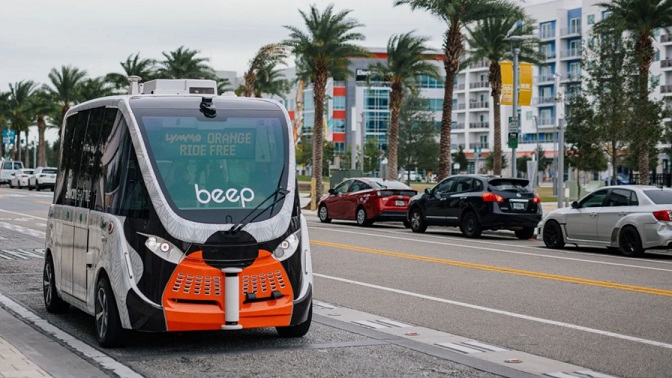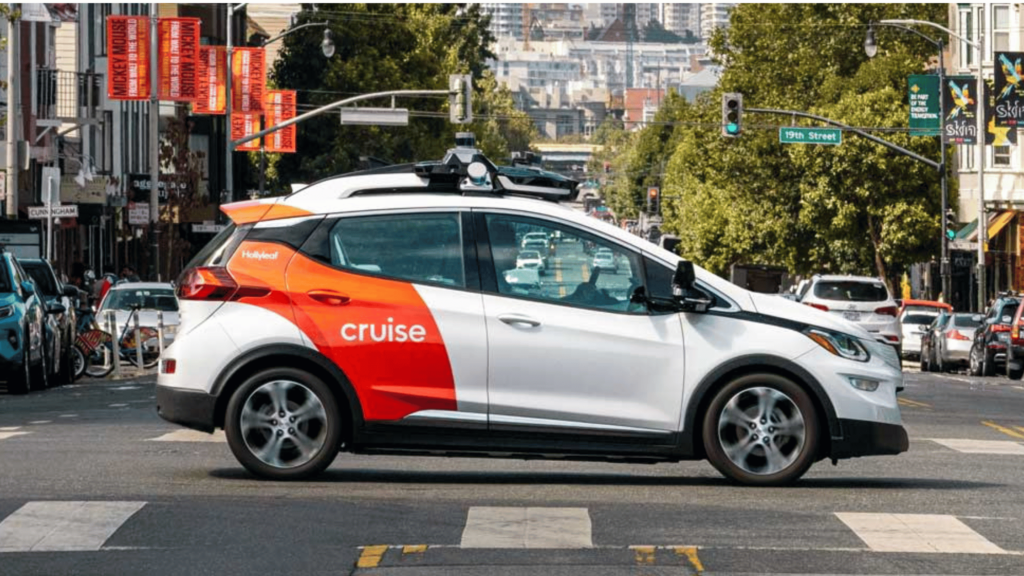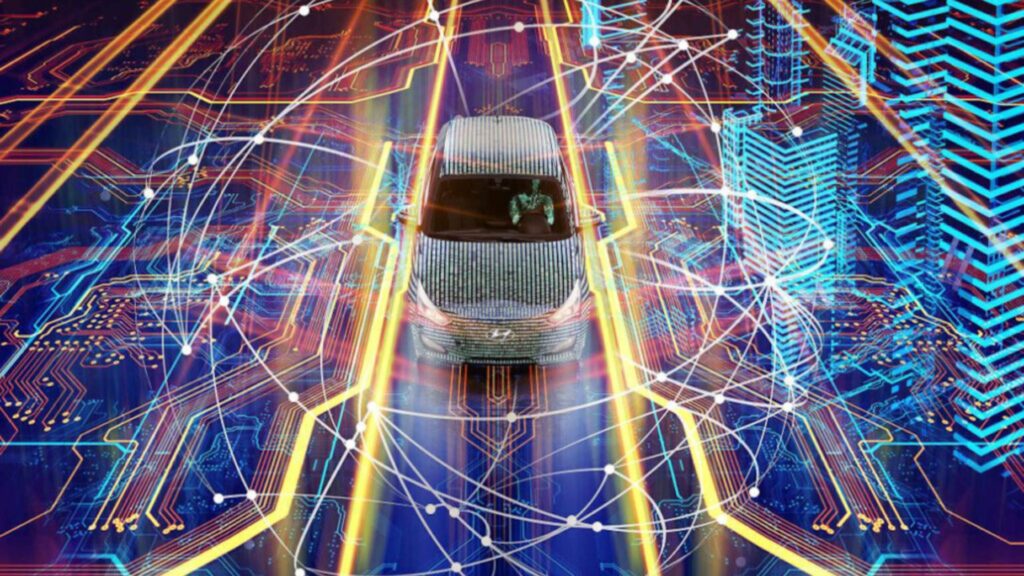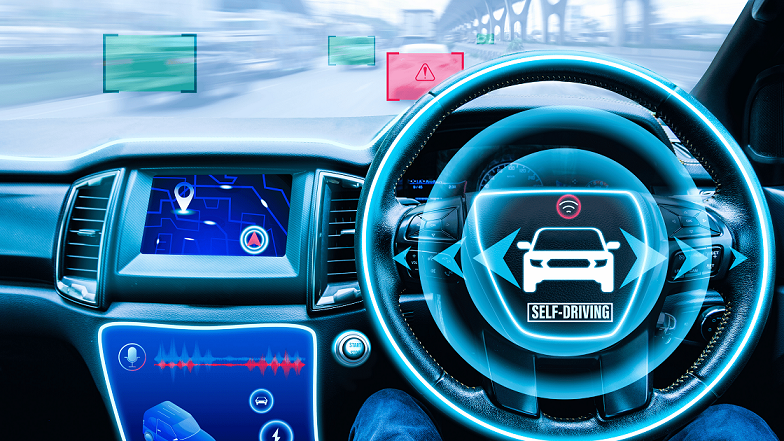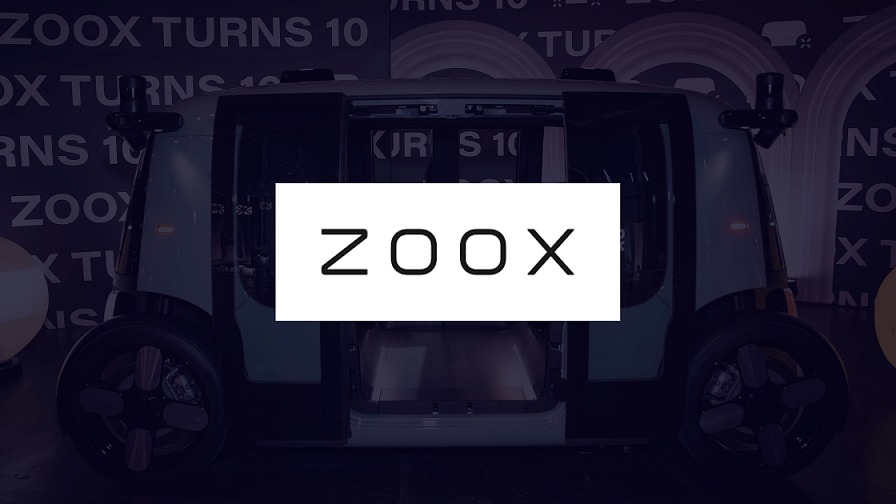Table of Contents
On June 30, 2025, Beep assisted the Jacksonville Transportation Authority (JTA) in Northeast Florida in launching the first fully autonomous public transportation network in the United States – the Neighborhood Autonomous Vehicle Innovation (NAVI).
Since its founding in 2018, Beep has made several notable achievements in the autonomous vehicle space, focusing on autonomous shared public transportation. They might not be as big as Waymo or have as many cars as Tesla, but one thing is certain: they are quietly breaking records in the shared autonomous shuttle industry, and that, in itself, is worth talking about.
With the help of its proprietary software technology, AutonomOS™, Beep has accumulated more than 200,000 live road hours and 168,000 passengers across multiple vehicle platforms in nine different states.
A Humble Beginning with a Clear Vision
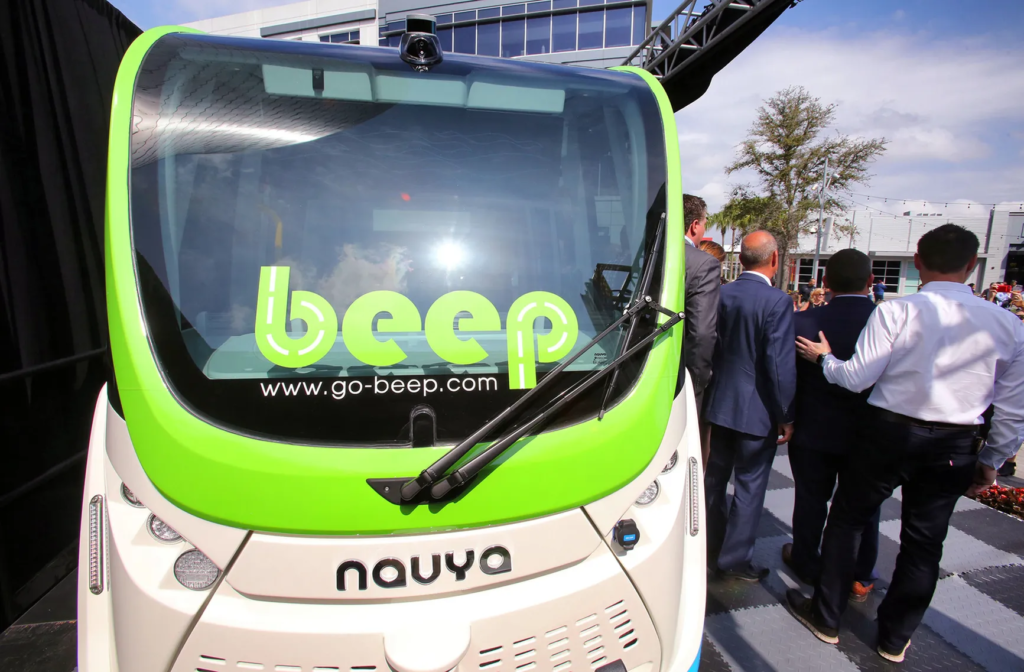
Founded in 2018 in Lake Nona, Florida—a community known for its own “living lab” approach to smart city technology—Beep emerged with a focused mission: to accelerate the safe adoption of autonomous shared mobility solutions for communities. Unlike companies developing technology for private car ownership, Beep’s North Star has always been shared mobility. This has allowed them to carve out and own a unique and critically important niche.
Beep’s core strategy is repeatable autonomous shuttle transit in controlled environments. It has proven to be both pragmatic and incredibly effective, building a foundation of trust and real-world data that is now paying increasing dividends.
Where other companies chase the dream of replacing personal vehicles, Beep focuses on something more collaborative: enhancing existing public transportation networks with autonomous shared shuttles. It’s a gentler vision of the future, one that prioritizes accessibility and community connection over individual convenience.
By 2025, Beep had successfully managed 38 autonomous shuttle deployments across nine U.S. states, serving public and private communities, universities, and commercial districts with a vehicle-agnostic approach that allows them to work with multiple manufacturers and automated driving systems.
The Technology Behind the Curtain
At the heart of Beep’s operations lies AutonomOS™, their proprietary software platform that serves as the central nervous system for their entire fleet. The trademark software creates a comprehensive ecosystem that manages, monitors, and continuously improves autonomous mobility services.
AutonomOS™ provides:
- Fleet Management: Overseeing vehicle health, routing, and scheduling in real-time.
- Remote Monitoring: Allowing human operators to intervene if a vehicle encounters a complex scenario it cannot navigate independently.
- Passenger Communication: Enabling interaction between riders and a command center.
- Data Analytics: Collecting and analyzing vast amounts of data to improve safety, efficiency, and route planning.
America’s First Fully Autonomous Public Transit Network
June 30, 2025, marked a watershed moment for American public transportation. The Jacksonville Transportation Authority launched NAVI (Neighborhood Autonomous Vehicle Innovation)—the nation’s first fully autonomous public transit system serving passengers along the Bay Street Innovation Corridor. This came after years of pilot programs and cautious experimentation.
As Joe Moye, CEO of Beep, aptly stated,
“Our focus has always been on how autonomous mobility can serve the public good. The launch of NAVI with the JTA is a testament to what’s possible when you combine visionary public leadership with safe, proven technology to create more connected, accessible, and sustainable communities.”
NAVI represents the first phase of JTA’s ambitious Ultimate Urban Circulator (U2C) program, a visionary three-phase project designed to reimagine urban mobility in Northeast Florida. The initial rollout services a 5.6-kilometre (3.5-mile) route connecting Downtown Jacksonville’s Central Business Core to the Sports & Entertainment District.
The route covers 13 stops across downtown Jacksonville, encouraging downtown revitalization by connecting key areas of the city.
The fleet itself represents a significant technological achievement: 14 electric, autonomous, Buy America- and ADA-compliant Ford E-Transit vehicles integrated with Oxa’s advanced automated driving system (ADS). Each vehicle is a testament to the fact that accessibility and autonomy can coexist beautifully.
The program is backed by a five-year operations and maintenance contract. Beep isn’t just helping to launch a service—they’re committing to its long-term success and continuous improvement.
According to an analysis conducted by the University of North Florida, the broader U2C project, which NAVI initiates, is projected to achieve the following:
| Economic Impact Category | Estimated Figure |
| Total Jobs Created | 4,141 |
| Total Labor Income | Nearly $294 Million |
| Key Benefitting Job Categories | Construction, Mechanics, Installers, Fabricators, Motor Vehicle Operators |
Furthermore, the project attracted HOLON, the State of Florida’s first automotive manufacturer, which will produce the next-generation shuttles for the U2C, generating hundreds of jobs and nearly $300 million in economic impact for the region.
The ripple effects touch numerous industries:
- Construction trade workers building new infrastructure
- Mechanics and technicians maintaining the autonomous fleet
- Installers and technicians deploying new technology
- Assemblers and fabricators in vehicle production
- Motor vehicle operators transitioning to fleet supervision roles
Autonomous Shuttles in Service of Healthcare
When COVID-19 transformed the world in 2020, Beep exemplified the flexibility and social value of autonomous mobility in the most compelling way possible. In partnership with the Jacksonville Transportation Authority and the Mayo Clinic, Beep deployed autonomous shuttles to move 22,000 COVID-19 test samples safely across the Mayo Clinic campus.
The deployment was far from glamorous. There were no ribbon-cutting ceremonies, no crowds of excited first-time riders. Instead, these autonomous shuttles quietly did what they do best: moved essential materials reliably, safely, and without exposing additional healthcare workers to potential infection.
It was a powerful demonstration that autonomous vehicles could serve society in ways that extended far beyond convenience and glamour. They could genuinely protect people during a public health crisis.
Expanding Horizons: Coast to Coast Deployments
Beep, Inc., as a company, has established partnerships across diverse environments:
California
In the San Francisco Bay Area’s Contra Costa County, Beep partnered with the Contra Costa Transportation Authority to launch autonomous shuttle services. The first pilot was launched in 2023 at Bishop Ranch business park in San Ramon, where autonomous shuttles have safely transported more than 1,600 passengers. The service later expanded to Walnut Creek, establishing the scalability of the model.
Hawaii
One deployment that better illustrated Beep’s versatility was their partnership at Daniel K. Inouye International Airport in Honolulu. Working with Sustainability Partners and the Hawaiʻi Department of Transportation, Beep operated a groundbreaking 18-month autonomous shuttle pilot—the first of its kind at a major American airport.
Georgia
In anticipation of the 2026 FIFA World Cup, Beep deployed four autonomous shuttles on a two-mile loop adjacent to the Atlanta Beltline, a 22-mile network of public parks, multi-use trails, and transit infrastructure. The deployment showcases how autonomous shuttles can enhance connectivity for major sporting events while serving the community long after it has come to an end.
Strategic Partnerships Shaping the Future
In January 2023, Beep announced a significant partnership with ZF, the German automotive supplier. The collaboration aimed to launch several thousand Level 4 autonomous shuttles across the United States, with ZF’s next-generation shuttles designed for urban environments and mixed traffic conditions. This represented a major evolution from earlier shuttles that required designated lanes.
Also, Beep entered a partnership with Tavistock Group to implement autonomous shuttle services as part of Lake Nona’s broader Move Nona initiative. Launched in September 2019, this initiative aimed to provide residents and visitors with efficient transportation options while reducing reliance on personal vehicles.
Florida State College of Jacksonville Autonomous Vehicle Curriculum
Working closely with partners, including the JTA and Oxa, Beep is developing the first accredited autonomous vehicle curriculum at Florida State College of Jacksonville.
The robust curriculum will prepare students for the inchoate autonomous vehicle industry, ensuring that jobs created are filled by a skilled local talent pool. Students will not just learn about autonomous vehicles in theory—they will engage with the actual technology being deployed in their city, understanding both the promise and the practical challenges of this emerging field.
The curriculum prepares future transportation leaders for roles that didn’t exist a decade ago: autonomous fleet supervisors, remote vehicle operators, AV maintenance specialists, and autonomous transportation planners. It’s an investment in ensuring that the autonomous vehicle revolution creates opportunities rather than simply displacing workers.

You May Also Like:
6 Best Self-Driving Cars in the US (2025)
Top 5 Autonomous Trucking Companies in the US (2025)
The Vehicle-Agnostic Advantage
One of Beep’s most strategically brilliant decisions has been their commitment to remaining vehicle-agnostic. In an industry where many companies are linked to specific technologies or manufacturers, Beep has maintained the flexibility to work with multiple vehicle platforms and automated driving systems.
This approach offers several compelling advantages:
Risk Mitigation: The autonomous vehicle industry remains in flux, with technologies evolving rapidly. By not betting everything on a single solution, Beep can adapt as the market matures.
Client Customization: Different communities have different needs. A university campus deployment might require smaller shuttles optimized for frequent stops, while an airport route might benefit from larger vehicles with more passenger and luggage capacity. Beep’s flexible approach allows them to match the right technology to each use case.
Continuous Innovation: Working with multiple technology partners means Beep can stay at the forefront of innovation, incorporating the best features from different systems rather than being locked into a single technology roadmap.
Operational Redundancy: If one vehicle platform experiences technical challenges, Beep’s operations don’t grind to a halt. They can shift to alternative platforms while issues are resolved.
Conclusion
The autonomous vehicle industry, including the shared shuttle segment, remains in a developmental phase. The technology shows tremendous promise, but significant challenges remain before it can fully replace conventional transit options. Challenges like safety policy regulations, technological edge cases, and user trust.
Beep’s approach, however, has generally been characterized by realistic expectations and incremental progress. Granted, the measured strategy may not generate the same headlines as companies promising massive autonomous robotaxi networks, but it allows for sustainable growth and continuous learning.
Each deployment serves as both a service to the community and a learning opportunity. What works in a controlled airport environment may not translate directly to an open urban network. What succeeds on a university campus with tech-savvy students may require modification for a community serving elderly residents.
Beep is proving that the future of transportation isn’t just about removing the driver; it’s about building smarter and safer transit networks for everyone. They may be relatively quiet, but their records speak volumes.
Also Read:
Top 20 US Autonomous Vehicle Companies (2025)
Autonomous Mobility: 10 Interesting Key Facts About Beep
Top 7 Autonomous Drone Delivery Companies in the US (2025)

I’m Dr. Brandial Bright, also known as the AVangelist. As a dedicated and passionate researcher in autonomous and electric vehicles (AVs and EVs), my mission is to educate and raise awareness within the automotive industry. As the Founder and Managing Partner of Fifth Level Consulting, I promote the adoption and innovation of advanced vehicle technologies through speaking engagements, consulting, and research as we progress to level 5 fully autonomous vehicles.

